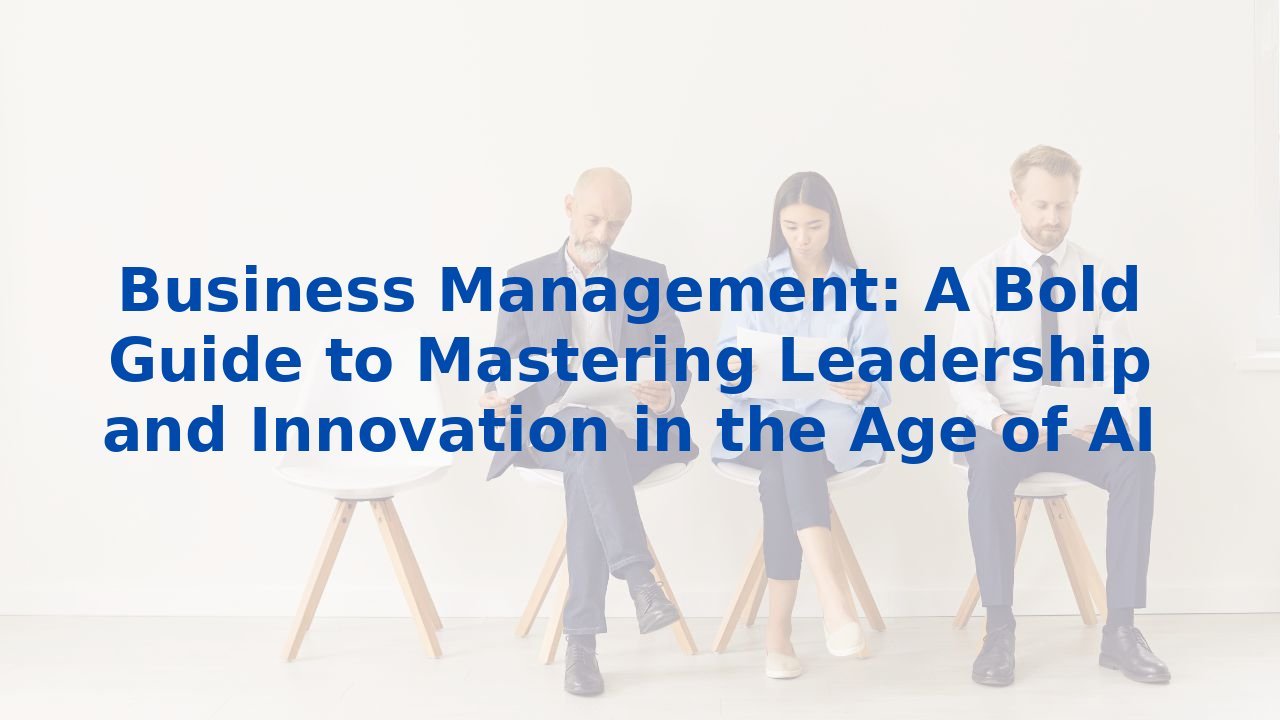Business Management: A Bold Guide to Mastering Leadership and Innovation in the Age of AI
Business Management: A Bold Guide to Mastering Leadership and Innovation in the Age of AI
As we dive into the evolution of business management, it's essential to recognize that this field is not just an art but a science that necessitates both leadership and organizational acumen. Enter the era of artificial intelligence (AI), a transformational force poised to redefine how we approach business processes. In this post, we’ll explore how AI enhances various facets of business management, focusing on the intersection of leadership, innovation, and operational efficiency.
The Psychological Contract: Leaders vs. Managers
In any organization, the distinction between leaders and managers is profound. Leaders ignite passion and motivate individuals to achieve greatness, while managers ensure that tasks are organized and executed efficiently. The introduction of AI can change the dynamics within this relationship. By automating routine tasks—like data entry and document management—AI allows both leaders and managers to redirect their energy toward strategic planning and innovation efforts. This shift facilitates a work environment where creativity is prioritized, and human potential is maximized.
Elevating Employee Engagement Through AI
Employee engagement isn't just a buzzword; it's the lifeblood of a thriving organization. In our AI-driven world, organizations can leverage technology to personalize experiences for their workforce. Imagine AI-driven chatbots designed to assist employees in real-time, addressing their concerns swiftly and effectively. This level of personalization fosters a sense of belonging and empowerment among employees, enhancing job satisfaction and engagement.
"When employees feel valued and understood, they’re more likely to contribute their best work."
Innovation: The Engine of Growth
Innovation serves as the engine that propels organizations forward. In the age of AI, the process of innovation can be turbocharged. AI's capacity to analyze extensive data sets rapidly provides companies with actionable insights. Predictive analytics models can foresee emerging market trends or shifts in customer behavior, enabling organizations to adapt quickly or even proactively shape their offerings. This not only affects product development but also strategic planning, allowing businesses to stay one step ahead of their competitors.
Process Discovery and Mapping: Finding Hidden Opportunities
To improve efficiency, businesses must first understand their existing processes. AI-driven process discovery tools utilize operational data to reveal hidden inefficiencies. By analyzing workflows and identifying patterns, organizations can redefine their processes for optimal performance. Imagine uncovering bottlenecks that you were previously unaware of and having the tools to streamline them effectively.
The Power of Process Automation
At the core of AI’s impact on business management is process automation. By employing AI algorithms, organizations can execute tasks such as customer queries or data processing with remarkable accuracy. This transformation not only expedites service delivery but also liberates employees from mundane tasks, allowing them to apply their creativity and problem-solving skills where they matter most.
Continuous Improvement: Adapting to Change
AI doesn’t just optimize processes once; it continuously learns and adapts to changing conditions. By analyzing performance metrics and feedback, AI identifies opportunities for further optimization. This relentless pursuit of excellence ensures that your processes not only align with current business goals but also remain flexible in the face of evolving market demands. In a world that is in constant flux, adaptability is key.
The Multifaceted Benefits of AI in Business Management
The integration of AI into business operations brings a suite of advantages:
- Operational Efficiency: Streamlining repetitive tasks to reduce errors and enhance speed.
- Data-Driven Decision-Making: Drawing from vast data stores to inform strategic choices.
- Cost Reduction: Identifying efficiencies that lower expenses sustainably.
- Enhanced Strategic Planning: Utilizing predictive analytics for informed product development.
Investing in Employee Training for AI
While AI has the potential to revolutionize business management, the path to success involves not just technology but people. Training employees in AI capabilities transforms them from mere users into empowered creators. Consider focusing on the following:
- Understanding AI Capabilities: Equip teams with knowledge about AI’s functionalities and limitations.
- Data Analysis Skills: Foster skills that enable employees to interpret AI-generated insights effectively.
- Adaptability: Instill a mindset that embraces change and agility in processes.
- Ethical Considerations: Discuss the importance of ethics in AI to ensure responsible application.
Conclusion: Embrace the Shift
As we stand on the precipice of the AI revolution in business management, the call to action is clear. By embracing AI technologies and investing in employee training, organizations can optimize their operations, enhance decision-making, and drive innovation. This journey propels businesses toward operational excellence, ensuring they remain agile and resilient in a rapidly evolving landscape.
Are you ready to unlock the potential of AI in your organization? The time for action is now.



